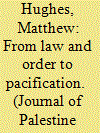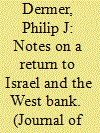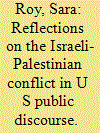|
|
|
Sort Order |
|
|
|
Items / Page
|
|
|
|
|
|
|
| Srl | Item |
| 1 |
ID:
096414


|
|
|
|
|
| Publication |
2010.
|
| Summary/Abstract |
This article examines British human rights abuses against noncombatants during the 1936-39 Arab Revolt in Palestine, contextualizing brutality in Palestine within British military practice and law for dealing with colonial rebellions in force at the time. It shows that the norms for such operations, and the laws that codified military actions, allowed for some level of systemic, systematic brutality in the form of "collective punishments" and "reprisals" by the British army. The article also details the effects of military actions on Palestinian civilians and rebels and describes torture carried out by the British on Palestinians. Finally, it highlights a methodological problem in examining these sorts of abuses: the paucity of official records and the mismatch between official and unofficial accounts of abuse during counterinsurgency.
|
|
|
|
|
|
|
|
|
|
|
|
|
|
|
|
| 2 |
ID:
096419


|
|
|
| 3 |
ID:
096417


|
|
|
| 4 |
ID:
098107


|
|
|
|
|
| Publication |
2010.
|
| Summary/Abstract |
This article examines the content of and justification for a new "ethical code" designed for the Israeli army to take into account the "fight against terror. " It argues that the code contains two innovations: it includes acts aimed exclusively at military targets in its definition of "terrorism," and it contains a principle of distinction that prioritizes the lives of citizen combatants over those of noncitizen noncombatants, contrary to centuries of theorizing about the morality of war as well as international humanitarian law. The article suggests that the principle of distinction played a direct role in Israel's offensive in Gaza in winter 2008-2009, as demonstrated by a preponderance of testimony indicating that Israeli military commanders explicitly instructed soldiers to give priority to their own lives over those of Palestinian noncombatants.
|
|
|
|
|
|
|
|
|
|
|
|
|
|
|
|
| 5 |
ID:
098111


|
|
|
|
|
| Publication |
2010.
|
| Summary/Abstract |
The following document, previously unpublished, was written in March 2010 by a recently retired ( June 2009) U.S. Army colonel with thirty years experience in the Middle East, including tours of duty and advisory roles (in both military/security and civilian domains) from North Africa to the Persian Gulf. The subject of the informal report is the author's first two trips as a "civilian" to Israel and the West Bank, where he had served two tours of duty, most recently as U.S. military attaché in Tel Aviv during Israel's 2005 unilateral disengagement from Gaza and the formation of the U.S. Security Coordinator's (USSC) mission to reform Palestinian Authority (PA) security forces.
Written as an internal document for military colleagues and government circles, the report has been circulating widely-as did the author's earlier briefings on travel or missions in Syria, Lebanon, Jordan, Egypt, and especially Iraq-among White House senior staff, the Joint Chiefs of Staff, the Defense Intelligence Agency, CENTCOM (U.S. Central Command), EUCOM (U.S. European Command), and the USSC team.
|
|
|
|
|
|
|
|
|
|
|
|
|
|
|
|
| 6 |
ID:
096416


|
|
|
| 7 |
ID:
098109


|
|
|
|
|
| Publication |
2010.
|
| Summary/Abstract |
Dr. Mohammad Mustafa is chairman and CEO of the Palestine Investment Fund (PIF) and an economic adviser to Palestinian Authority President Mahmud Abbas. PIF, the leading investor in Palestine, is a publicly limited company fully owned by the people of Palestine. It was established in 2003 with the transfer of assets managed by the Palestinian Authority. Financially and administratively autonomous, it is governed by an independent board of directors and a general assembly representing civil society, nongovernmental organizations, academia, and the public and private sectors. In pursuit of its mandate-which is to strengthen the local economy through investments that foster sustainable economic development while maintaining and increasing existing national reserves-PIF owns direct majority and minority stakes in companies and follows a business model based on public-private partnerships. Currently, PIF has approximately $800 million in assets under management and is leading a $4 billion investment program aimed at stimulating economic growth and creating over 100,000 new job opportunities within the next five years.
|
|
|
|
|
|
|
|
|
|
|
|
|
|
|
|
| 8 |
ID:
098108


|
|
|
|
|
| Publication |
2010.
|
| Summary/Abstract |
Arguing that the polarization of the Palestinian political field did not start with Hamas's takeover of the Gaza Strip in 2007, the author analyzes the factors that have eroded the cohesiveness and vitality of the Palestinian polity, namely, the paralysis of Palestinian political institutions, territorial and social fragmentation, and egregious outside interference. In this context, and in the absence of an internal Palestinian debate about the objectives of holding elections under occupation, the author shows that the timing and circumstances of the 2006 legislative elections were bound to precipitate the current state of disarray. Finally, he considers the way forward, highlighting the potential of public pressure in promoting national reconciliation.
|
|
|
|
|
|
|
|
|
|
|
|
|
|
|
|
| 9 |
ID:
096418


|
|
|
| 10 |
ID:
096415


|
|
|
|
|
| Publication |
2010.
|
| Summary/Abstract |
This essay argues that the climate of intimidation and fear surrounding a more critical discussion of the Israeli-Palestinian conflict in the United States has begun to change. Despite the obstacles that still remain, a counterdiscourse challenging dominant conceptualizations and understandings of the conflict, particularly Israel's role, has not only emerged but also gained growing legitimacy and weight. These changes can be found in academia (at all levels of the educational hierarchy), civil society, and policy circles. Some of the most dramatic changes have occurred within the U.S. Jewish community in which an oppositional movement-in part, generational-has grown increasingly strong and well organized, ending any notion of a Jewish consensus on Israel.
|
|
|
|
|
|
|
|
|
|
|
|
|
|
|
|
| 11 |
ID:
098110


|
|
|
|
|
| Publication |
2010.
|
| Summary/Abstract |
Hasib Sabbagh, who died on 12 January 2010 after a long illness, was arguably the preeminent Palestinian entrepreneur in the business and contracting fields in the post-1948 period. Born to an old and distinguished Greek Catholic family of Safad in Eastern Galilee, Sabbagh established the Consolidated Contractors Company (CCC) in 1945 in Haifa with several partners after graduating in engineering from the American University of Beirut. Under his dynamic leadership and with the cooperation of his life-long partner, Said Khoury, the CCC (which Sabbagh reconstituted in Lebanon after the fall of Palestine) evolved from a modest local enterprise into the giant global multinational corporation that it is today. Using the CCC as his base, he began as of the early 1970s to devote his great energy to the service of Palestine, not only through his philanthropic ventures promoting social and educational causes, but also through his behind-the-scenes political mediation and reconciliation efforts. The following reminiscences trace the unusual partnership and friendship between the author, whose orientation was largely academic, and Sabbagh, whose approach reflected his big-business milieu. The two met in 1972 around the time when Sabbagh was embarking on his public service phase. They became fast friends and remained so until Sabbagh's death, joined by their common dedication to Palestine. The memoir includes Sabbagh's own account of his departure from Palestine in 1948 and sheds light on some relatively little known activities of the Palestinian business and academic elite in the post-1967 period.
|
|
|
|
|
|
|
|
|
|
|
|
|
|
|
|
|
|
|
|
|